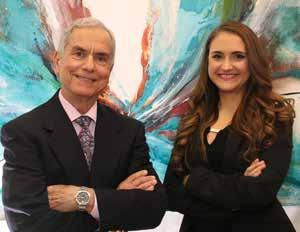
7 minute read
Building a Better Community
professionalism diversity
by keith grossman, esq.
Dr. Peter Ndiang’ui, Adjunct Professor at Florida Gulf Coast University, was born during the war for Kenya’s independence. He says, “The atrocities meted by the colonizers and their collaborators against my parents and all of us necessitated that we hate everything British. But my mother taught us of the futility of hate. From early times in my life, the Buddha quote that ‘holding onto anger is like drinking poison and expecting the other person to die’ acquired reality in the teachings of my mama. My mother also reminded us that goodness or badness was not unique to any one group of people. She reminded us that good and bad people are right here with us, and good and bad people are out there as well. I am therefore driven by her words and these words from Abraham Lincoln: ‘I do not like that person. I must get to know them better.’” Ndiang’ui’s personal experiences and perspective reminds us of the importance of “Diversity & Inclusion”. Diversity reminds us of our differences and the positive aspects that brings to an organization. Inclusion is creating a sense of belonging and support from the organization. Together, they create an environment of value and respect. On June 17, 2022, the Lee County Bar Association, and Ita M. Neymotin, Regional Conflict Counsel of the Office of Criminal Conflict & Civil Regional Counsel, Second District Court of Appeal, are sponsoring a “Professionalism and ‘Diversity and Inclusion’ Seminar”. Topics related to professionalism and “Diversity and Inclusion” will be presented by a host of speakers. CLE credits are being offered, and you can register at the LCBA website.
Neymotin, who is also co-Chair of the LCBA Diversity & Inclusion
Building a Better Community
diversity inclusion
Committee, says, “Having immigrated from Kazakhstan many years ago, I have first-hand experience on the importance of diversity and inclusion. When parties of different ethnic backgrounds listen to and genuinely include one another by understanding and embracing our differences, we become wiser, more inclusive, and better as a community.” Ndiang’ui also says, “In the last decade, I have become a scholar of Viktor Frankl and his search for meaning in every situation. This quote helps me to find meaning particularly in situations in which I feel discriminated against for whatever reason. Faced by such circumstances that would tempt one to return hate for hate, I am empowered by this quote from Viktor Frankl: ‘The truth that love is the ultimate and highest goal to which man can aspire, I understood how a man who has nothing left in this world still may know bliss, be it only for a brief moment, in the contemplation of his beloved.’ And finally, Paul’s letter to Corinthians constantly reminds me that ‘Love never fails’. In May 2010, the Florida Bar recognized the need to show leadership on the topic of diversity & inclusion. Following recommendations from the Program Evaluation Committee, the Florida Bar overhauled its diversity efforts and created the Diversity and Inclusion Committee. In addition to creating the committee, the Bar also created a Bar staff role regarding diversity and inclusion.
The Florida Bar created the following Mission Statement:
To increase diversity and inclusion in The Florida Bar so that the Bar will reflect the demographics of the state, to develop opportunities for community involvement, and to make leadership roles within the profession and The Florida Bar accessible to all attorneys, including those who are racially,

-Henry Lee Paul
ethnically and culturally diverse, women, members of the
LGBTQ community and persons with disabilities. The Florida Bar Board of Governors further defined diversity as follows:
“The term ‘diversity’ has a dynamic meaning that changes as the demographics of Floridians change. Apart from differences in race, color, gender, national origin, religion, age, sexual orientation, citizenship, and geography, to mention a few, the public and our profession will experience changes in thought, culture, and beliefs. These demographics are constantly in flux.
Defining ‘diversity’ based on current differences would limit its application to future changes, and likewise restrict or limit The
Florida Bar’s consideration of and response to such changes.” The Florida Bar’s Program Evaluation Committee offered a total of 12 recommendations, which included the following: • Diversity grant program for local bars • Outreach program • Increasing communication to sections, committees, divisions, voluntary bar associations, and Bar members about Bar diversity efforts • CLEs
• Having some type of diversity program at each Bar Annual
Convention
In February 2014, Florida Bar President Eugene Pettis appointed an 11-member task force to determine why diverse candidates were not applying for Judicial Nominating Commission appointment or for judgeships. The task force issued a report in May 2014. The first recommendation of the task force was to encourage then-Governor Rick Scott to fill the existing 78 vacancies on Judicial Nominating Committees (JNCs) with diverse appointments. The second recommendation was for the Bar to work with the governor to let JNC appointees know diversity matters. Additionally, the report urged the governor not to reject slates of nominees the Bar recommends from its rigorous review and selection process. The task force’s other recommendations included:
• Review the processes used by JNCs in identifying, recruiting and evaluating nominees for appointment to
Florida’s judiciary; • Determine whether JNC processes impede recruitment and nomination of applicants diverse in race, ethnicity, gender, color, national origin, sexual orientation, physical disabilities or status as a protected veteran under federal law; • Redirect processes through reforming JNC outreach, interview and evaluation methods; • Address ways to recruit diverse lawyers to apply for JNCs and for judgeships; and • Provide assistance to diverse judges when they first stand for election subsequent to their appointment. Florida Bar President-elect Gary Lesser explains the application of those principles. He says, “In our appointments to committees, we take great effort to include diverse backgrounds and experiences.” Lesser says, “Everyone should have the same opportunities.” Lesser is one of the featured speakers at the June 17th seminar. The focus of his presentation will mostly be about professionalism. Lesser explains the Florida Bar’s Committee on Professionalism, which he is co-Chair, is recommending the following changes: • Improve the way we teach professionalism; • Increase the number of required professionalism CLEs to three (one would be viewing a video produced by the
Florida Bar); and • Create uniformity amongst the local professionalism panels. Attorney Henry Lee Paul is former Bar Counsel in the Tampa Branch of The Florida Bar and former member of the Student
Education and Admission to the Bar Committee. He will be speaking at the June 17th seminar. Paul says, “In my practice, I deal with professionalism issues on a daily basis. Professionalism is about respect for others and respect for our legal system. Professionalism inherently involves acceptance and application of the principles of diversity and inclusion. The rule of law can only thrive if our profession applies the law with respect for all members of society. The best lawyers are also the most professional lawyers. A lawyer cannot be professional without embracing the concepts of diversity and inclusion.” Katie Young, Assistant Director of the Henry Latimer Center for Professionalism, will also be speaking at the seminar. She says, “Diversity and Inclusion is important to the legal community first and foremost because of public perception—a diverse bar and bench that reflects our society as a whole, creates a greater trust in the rule of law and fosters confidence in our system.” Attorney Holly Cosby, who is also slated to speak at the seminar, says, “In order to truly achieve diversity, equity, and inclusion, people need to be willing to have regular, uncomfortable discussions. Change occurs when we stop being comfortable and confront difficult issues. For many, this will include doing away with systems that have disproportionate benefits. For many, this will require sacrificing access and entitlement.” Other speakers at the seminar include: • Honorable Justice Alan Lawson, Florida Supreme Court; • Honorable Kathleen Passidomo, Senate President-
Designate; • Honorable F. Scott Westheimer, President-Elect Designate of the Florida Bar; • Honorable Ed Brodsky, State Attorney for the 12th
Judicial Circuit and President of the Florida Prosecuting
Attorneys Association; • Honorable Rex Dimmig; Public Defender for the 10th
Judicial Circuit and President of the Florida Public
Defender Association; • Frank G. Abernathy, Esq., Worldwide Diversity & Inclusion
Counselor & Advocate; • Honorable Tiffany Pereira, President of the Lee County
Bar Association; • Honorable Carmine Marceno, Lee County Sheriff; • Dr. J. Preston Jones, Professor of Management at
Campbellsville University and Retired Dean of Nova
Southeastern University, Huizenga College of Business; and
• Kelly Fayer, Esq., Past President of the Lee County Bar
Association.
The Legacy Continues The Legacy Continues
Helping Save Families since 1971
Sheldon E. Finman, Esquire | Julia L. Finman, Esquire A respectful approach to divorce. Client-centered, child-focused, problem-solving transition from marriage. Divorce does not have to be a destructive process.

239-332-4543 RespectfulDivorces.com
2134 McGregor Blvd., Fort Myers, Fl 33901

